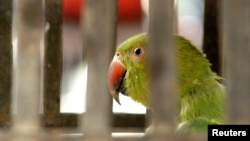Calling someone a "bird brain" used to be an insult. Not anymore.
A study published online Tuesday in the Proceedings of the National Academy of Sciences found that birds have more densely packed neurons in their brains than other animals, contributing to cognitive ability on par with that of primates.
"For a long time, having a ‘bird brain’ was considered to be a bad thing. Now it turns out that it should be a compliment," said the study's senior author, Suzana Herculano-Houzel, a Vanderbilt University neuroscientist.
Parrots and crows have cognitive abilities similar to those of primates, the study found.
The birds can make tools and use them to obtain food and solve other problems. They also can recognize themselves in mirrors and plan for future needs — cognitive capabilities only primates were previously thought to have possessed.
The findings contribute to the ongoing theory that, although brain structures may be different in classes of animals, it is not necessarily the size — or even the structure — that makes a brain more advanced. It may be the contents.
An earlier study found that trained pigeons can detect malignant tumors in mammograms with the pinpoint accuracy of human radiologists.
Herculano-Houzel and her co-author, Pavel Nemec, a researcher at Charles University in Prague, found that birds generally have more neurons than some mammals, but parrots and songbirds packed twice as many neurons on average than primate brains, "indicating that avian brains have higher neuron-packing densities than mammalian brains," the study said.
"That explains why they exhibit levels of cognition at least as complex as primates."
Although the link between intelligence and the number of neurons has not been firmly established, the scientists believe that the brains of birds with the same number of neurons as much larger mammal brains can potentially produce higher "cognitive power" per kilogram.





